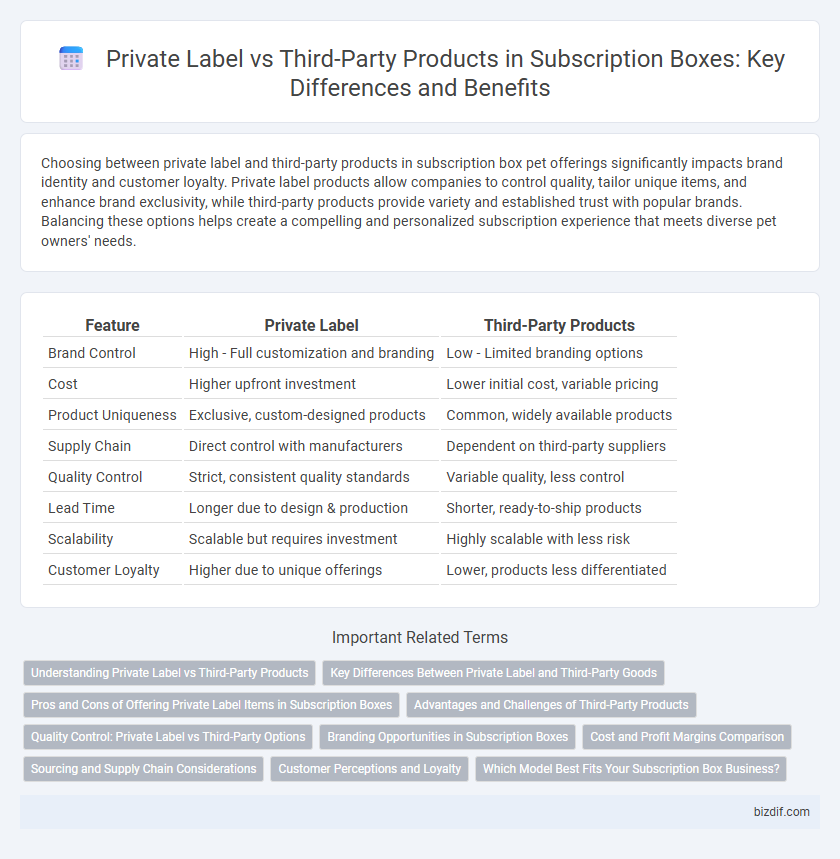Choosing between private label and third-party products in subscription box pet offerings significantly impacts brand identity and customer loyalty. Private label products allow companies to control quality, tailor unique items, and enhance brand exclusivity, while third-party products provide variety and established trust with popular brands. Balancing these options helps create a compelling and personalized subscription experience that meets diverse pet owners' needs.
Table of Comparison
| Feature | Private Label | Third-Party Products |
|---|---|---|
| Brand Control | High - Full customization and branding | Low - Limited branding options |
| Cost | Higher upfront investment | Lower initial cost, variable pricing |
| Product Uniqueness | Exclusive, custom-designed products | Common, widely available products |
| Supply Chain | Direct control with manufacturers | Dependent on third-party suppliers |
| Quality Control | Strict, consistent quality standards | Variable quality, less control |
| Lead Time | Longer due to design & production | Shorter, ready-to-ship products |
| Scalability | Scalable but requires investment | Highly scalable with less risk |
| Customer Loyalty | Higher due to unique offerings | Lower, products less differentiated |
Understanding Private Label vs Third-Party Products
Private label products are manufactured exclusively for a specific brand, allowing subscription boxes to offer unique, customized items that enhance brand identity and customer loyalty. Third-party products come from external brands, providing variety and recognized quality without the need for production investment. Understanding the balance between private label and third-party products is crucial for subscription box companies aiming to optimize cost, exclusivity, and customer satisfaction.
Key Differences Between Private Label and Third-Party Goods
Private label products are manufactured exclusively for a specific brand, allowing full control over product design, packaging, and quality, which helps build brand identity and customer loyalty in subscription boxes. Third-party products come from external suppliers and are resold without customization, offering quicker inventory access but less differentiation and control over the customer experience. Cost efficiency and scalability often drive the choice between private label's higher upfront investment and third-party's lower risk model in subscription box businesses.
Pros and Cons of Offering Private Label Items in Subscription Boxes
Offering private label items in subscription boxes enhances brand identity and customer loyalty by providing exclusive, customizable products tailored to target audiences. These items typically yield higher profit margins and greater control over quality and inventory, but require significant upfront investment in product development, manufacturing, and marketing. Conversely, the risk of slower market testing and potential challenges in scaling production may offset the benefits of exclusivity and differentiation.
Advantages and Challenges of Third-Party Products
Third-party products in subscription boxes offer a wide variety of choices and allow businesses to quickly diversify their offerings without the need for manufacturing expertise or inventory management. Challenges include less control over quality, potential supply chain disruptions, and difficulties in differentiating the subscription service due to widespread product availability. Leveraging trusted third-party suppliers can enhance customer satisfaction but requires diligent vetting and ongoing relationship management to maintain product consistency and exclusivity.
Quality Control: Private Label vs Third-Party Options
Private label subscription boxes offer superior quality control because brands directly oversee product selection, manufacturing, and packaging processes, ensuring consistency and adherence to standards. Third-party products pose quality risks due to reliance on external suppliers, making it challenging to maintain uniformity and address defects promptly. Investing in private label solutions enhances customer satisfaction through reliable, high-quality offerings tailored to brand specifications.
Branding Opportunities in Subscription Boxes
Private label products in subscription boxes allow brands to fully customize packaging, design, and product formulations, creating a unique brand identity that strengthens customer loyalty and recognition. Third-party products offer variety and cost-efficiency but limit branding control, as packaging and product design often reflect the original manufacturer. Leveraging private label products maximizes branding opportunities, enabling companies to deliver exclusive experiences and reinforce their market positioning in the subscription box industry.
Cost and Profit Margins Comparison
Private label subscription boxes typically incur lower production costs since brands control manufacturing and sourcing, leading to higher profit margins. Third-party products often involve wholesale pricing and fees, which can reduce overall profitability but offer a diverse range of established brand items. Evaluating cost structures and customer appeal is crucial to maximizing margins in each model.
Sourcing and Supply Chain Considerations
Private label subscription boxes offer complete control over sourcing and supply chain management, enabling customization of product quality, packaging, and branding to meet specific customer preferences. Third-party products rely on external suppliers, which may limit flexibility but can reduce upfront investment and simplify inventory management. Evaluating supplier reliability, lead times, and scalability is crucial for both approaches to ensure consistent delivery and customer satisfaction.
Customer Perceptions and Loyalty
Private label subscription boxes often foster stronger customer loyalty due to the perception of unique, high-quality products tailored specifically for their audience. In contrast, third-party products can sometimes dilute brand identity, leading to weaker emotional connections and reduced repeat purchases. Exclusive private label offerings enhance trust and satisfaction, driving long-term subscriber retention and higher lifetime value.
Which Model Best Fits Your Subscription Box Business?
Choosing between private label and third-party products depends on your subscription box's brand control needs and scalability goals. Private label products offer customization and stronger brand identity, ideal for businesses targeting niche markets or building customer loyalty. Third-party products reduce upfront costs and inventory risks, making them suitable for testing new markets or maintaining a diverse product mix.
Private label vs Third-party products Infographic

 bizdif.com
bizdif.com